非谓语动词 V-ing专题及练习
- 格式:doc
- 大小:83.00 KB
- 文档页数:10
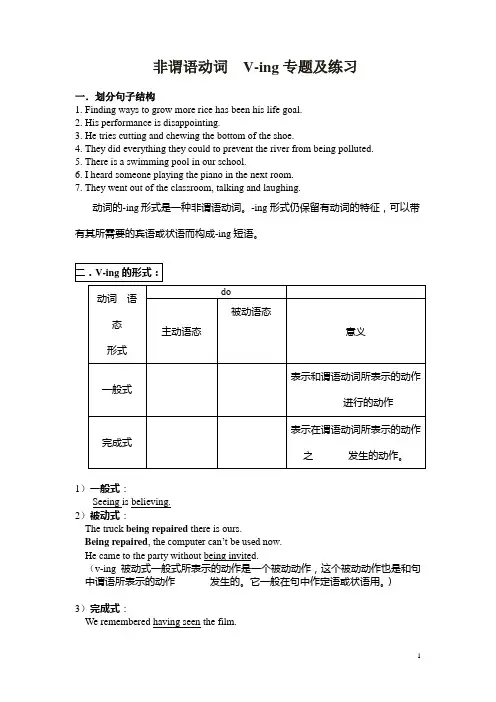
非谓语动词V-ing专题及练习一.划分句子结构1. Finding ways to grow more rice has been his life goal.2. His performance is disappointing.3. He tries cutting and chewing the bottom of the shoe.4. They did everything they could to prevent the river from being polluted.5. There is a swimming pool in our school.6. I heard someone playing the piano in the next room.7. They went out of the classroom, talking and laughing.动词的-ing形式是一种非谓语动词。
-ing形式仍保留有动词的特征,可以带1)一般式:________Seeing is believing.2)被动式:________The truck being repaired there is ours.Being repaired, the computer can’t be used now.He came to the party without being invited.(v-ing被动式一般式所表示的动作是一个被动动作,这个被动动作也是和句中谓语所表示的动作_______发生的。
它一般在句中作定语或状语用。
)3)完成式:________We remembered having seen the film.Having answered the letter, she went on to read an English novel.(v-ing完成式所表示的动作发生在句中谓语动词所表示的动作之______,一般在句中作宾语,时间或原因状语用。
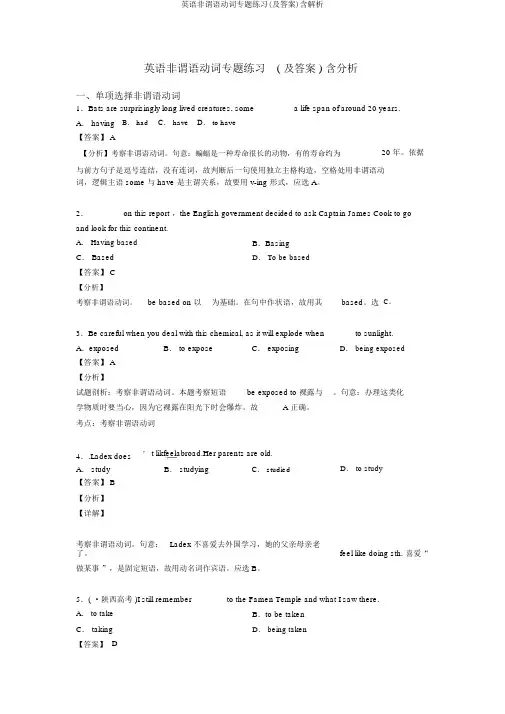
英语非谓语动词专题练习( 及答案 ) 含分析一、单项选择非谓语动词1.Bats are surprisingly long lived creatures, some ________ a life span of around 20 years. A. having【答案】 AB. had C. have D. to have【分析】考察非谓语动词。
句意:蝙蝠是一种寿命很长的动物,有的寿命约为20 年。
依据与前方句子是逗号连结,没有连词,故判断后一句使用独立主格构造,空格处用非谓语动词,逻辑主语 some 与 have 是主谓关系,故要用 v-ing 形式,应选 A。
2.________on this report ,the English government decided to ask Captain James Cook to go and look for this continent.A. Having based C. Based【答案】 C B.Basing D. To be based【分析】考察非谓语动词。
be based on 以为基础。
在句中作状语,故用其based。
选C。
3.Be careful when you deal with this chemical, as it will explode when ______ to sunlight. A.exposed B. to expose C. exposing D. being exposed 【答案】 A【分析】试题剖析:考察非谓语动词。
本题考察短语be exposed to 裸露与。
句意:办理这类化学物质时要当心,因为它裸露在阳光下时会爆炸。
故 A 正确。
考点:考察非谓语动词4..Ladex does A. study ’t likfe e l a broad.Her parents are old.B. studying C. studied D. to study【答案】 B【分析】【详解】考察非谓语动词。
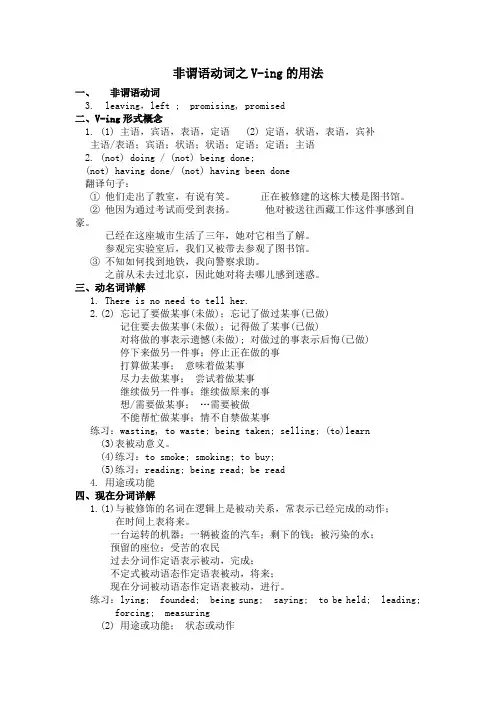
非谓语动词之V-ing的用法一、非谓语动词3. leaving,left ; promising, promised二、V-ing形式概念1. (1) 主语,宾语,表语,定语 (2) 定语,状语,表语,宾补主语/表语;宾语;状语;状语;定语;定语;主语2. (not) doing / (not) being done;(not) having done/ (not) having been done翻译句子:①他们走出了教室,有说有笑。
正在被修建的这栋大楼是图书馆。
②他因为通过考试而受到表扬。
他对被送往西藏工作这件事感到自豪。
已经在这座城市生活了三年,她对它相当了解。
参观完实验室后,我们又被带去参观了图书馆。
③不知如何找到地铁,我向警察求助。
之前从未去过北京,因此她对将去哪儿感到迷惑。
三、动名词详解1. There is no need to tell her.2.(2) 忘记了要做某事(未做);忘记了做过某事(已做)记住要去做某事(未做);记得做了某事(已做)对将做的事表示遗憾(未做); 对做过的事表示后悔(已做)停下来做另一件事;停止正在做的事打算做某事;意味着做某事尽力去做某事;尝试着做某事继续做另一件事;继续做原来的事想/需要做某事;…需要被做不能帮忙做某事;情不自禁做某事练习:wasting, to waste; being taken; selling; (to)learn(3)表被动意义。
(4)练习:to smoke; smoking; to buy;(5)练习:reading; being read; be read4. 用途或功能四、现在分词详解1.(1)与被修饰的名词在逻辑上是被动关系,常表示已经完成的动作;在时间上表将来。
一台运转的机器;一辆被盗的汽车;剩下的钱;被污染的水;预留的座位;受苦的农民过去分词作定语表示被动,完成;不定式被动语态作定语表被动,将来;现在分词被动语态作定语表被动,进行。
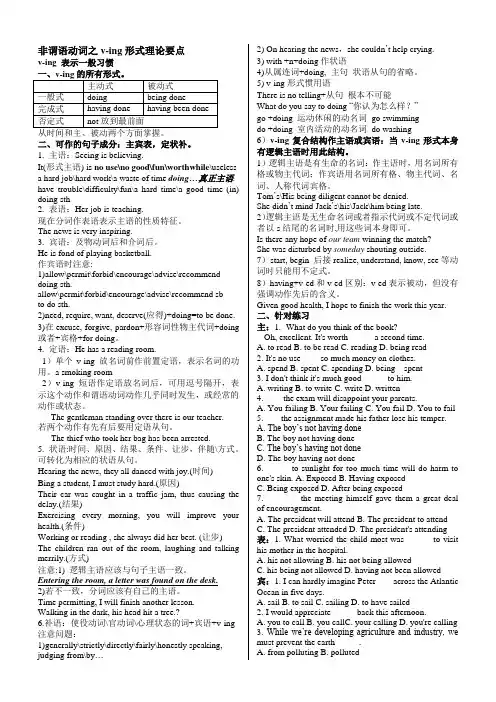
非谓语动词之v-ing形式理论要点v-ing 表示一般习惯二、可作的句子成分:主宾表,定状补。
1. 主语:Seeing is believing.It(形式主语) is no use\no good\fun\worthwhile\useless a hard job\hard work\a waste of time doing…真正主语. have trouble\difficulty\fun\a hard time\a good time (in) doing sth2. 表语:Her job is teaching.现在分词作表语表示主语的性质特征。
The news is very inspiring.3. 宾语:及物动词后和介词后。
He is fond of playing basketball.作宾语时注意:1)allow\permit\forbid\encourage\advise\recommend doing sth.allow\permit\forbid\encourage\advise\recommend sbto do sth.2)need, require, want, deserve(应得)+doing=to be done.3)在excuse, forgive, pardon+形容词性物主代词+doing 或者+宾格+for doing。
4. 定语:He has a reading room.1)单个v-ing 放名词前作前置定语,表示名词的功用。
a smoking room2)v-ing 短语作定语放名词后,可用逗号隔开,表示这个动作和谓语动词动作几乎同时发生,或经常的动作或状态。
The gentleman standing over there is our teacher.若两个动作有先有后要用定语从句。
The thief who took her bag has been arrested.5. 状语:时间、原因、结果、条件、让步,伴随\方式。
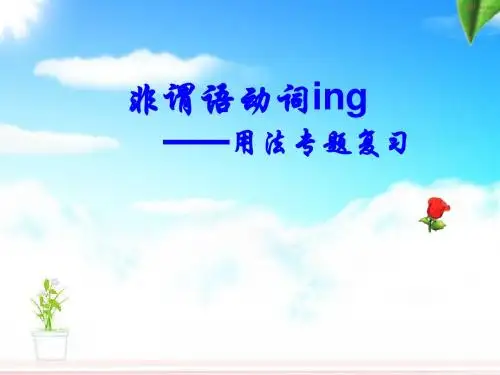
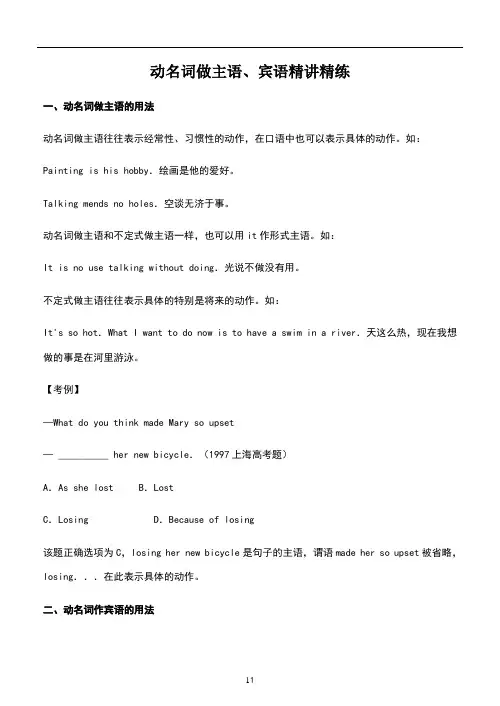
动名词做主语、宾语精讲精练一、动名词做主语的用法动名词做主语往往表示经常性、习惯性的动作,在口语中也可以表示具体的动作。
如:Painting is his hobby.绘画是他的爱好。
Talking mends no holes.空谈无济于事。
动名词做主语和不定式做主语一样,也可以用it作形式主语。
如:It is no use talking without doing.光说不做没有用。
不定式做主语往往表示具体的特别是将来的动作。
如:It's so hot.What I want to do now is to have a swim in a river.天这么热,现在我想做的事是在河里游泳。
【考例】—What do you think made Mary so upset— __________ her new bicycle.(1997上海高考题)A.As she lost B.LostC.Losing D.Because of losing该题正确选项为C,losing her new bicycle是句子的主语,谓语made her so upset被省略,losing...在此表示具体的动作。
二、动名词作宾语的用法1.有些动词或短语动词后常用动名词作宾语。
如admit,appreciate,avoid,can't stand(不能忍受),consider,delay,de- vote...to,dislike enjoy,escape,excuse,feel like,finish,forgive,get down to,give up,imagine,insist on,keep(on),look forward to,mention,mind,miss(错过),pay attention to,practice, put off,stick to,suggest 等等。
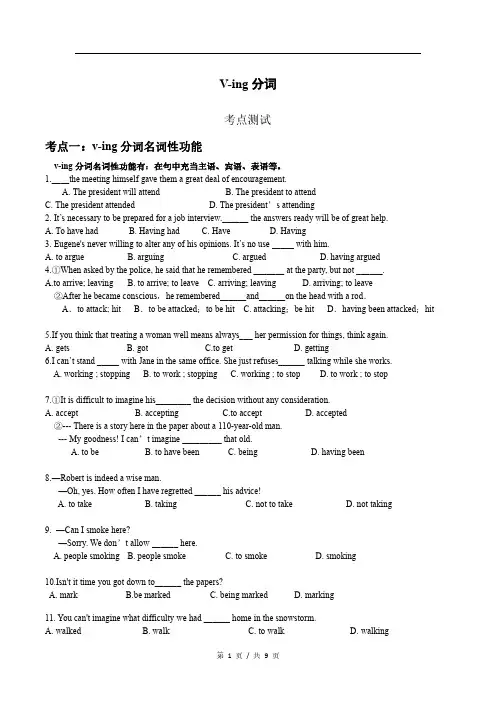
V-ing分词考点测试考点一:v-ing分词名词性功能v-ing分词名词性功能有:在句中充当主语、宾语、表语等。
1.____the meeting himself gave them a great deal of encouragement.A.The president will attendB.The president to attendC.The president attendedD.The president’s attending2.It’s necessary to be prepared for a job interview.______the answers ready will be of great help.A.To have hadB.Having hadC.HaveD.Having3.Eugene's never willing to alter any of his opinions.It’s no use_____with him.A.to argueB.arguingC.arguedD.having argued4.①When asked by the police,he said that he remembered_______at the party,but not______.A.to arrive;leavingB.to arrive;to leaveC.arriving;leavingD.arriving;to leave②After he became conscious,he remembered______and______on the head with a rod.A.to attack;hit B.to be attacked;to be hit C.attacking;be hit D.having been attacked;hit5.If you think that treating a woman well means always___her permission for things,think again.A.getsB.gotC.to getD.getting6.I can’t stand_____with Jane in the same office.She just refuses______talking while she works.A.working;stoppingB.to work;stoppingC.working;to stopD.to work;to stop7.①It is difficult to imagine his________the decision without any consideration.A.acceptB.acceptingC.to acceptD.accepted②---There is a story here in the paper about a110-year-old man.---My goodness!I can’t imagine_________that old.A.to beB.to have beenC.beingD.having been8.—Robert is indeed a wise man.—Oh,yes.How often I have regretted______his advice!A.to takeB.takingC.not to takeD.not taking9.—Can I smoke here?—Sorry.We don’t allow______here.A.people smokingB.people smokeC.to smokeD.smoking10.Isn't it time you got down to______the papers?A.markB.be markedC.being markedD.marking11.You can't imagine what difficulty we had______home in the snowstorm.A.walkedB.walkC.to walkD.walking考点二:v-ing分词形容词性功能v-ing分词形容性功能有:在句中充当定语、表语、补足语等。
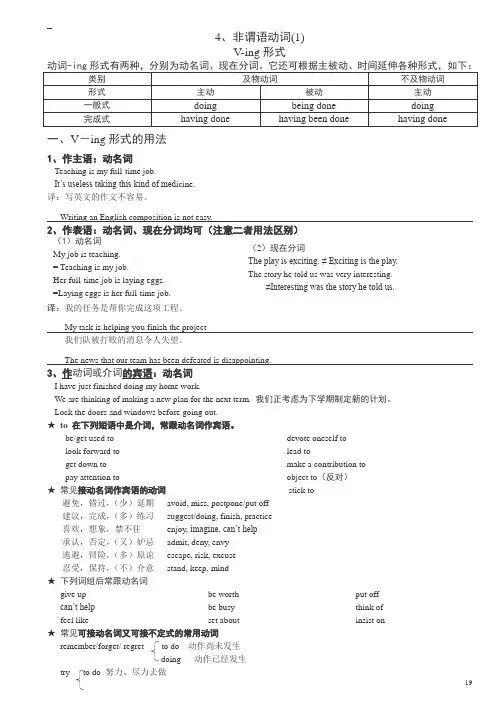
4、非谓语动词(1)V-ing 形式一、V -ing 形式的用法1、作主语:动名词Teaching is my full-time job.It’s useless taking this kind of med icine.译:写英文的作文不容易。
Writing an English composition is not easy.2、作表语:动名词、现在分词均可(注意二者用法区别)译:我的任务是帮你完成这项工程。
My task is helping you finish the project我们队被打败的消息令人失望。
The news that our team has been defeated is disappointing.3、作动词或介词的宾语:动名词I have just finished doing my home work.We are thinking of making a new plan for the next term. 我们正考虑为下学期制定新的计划。
Lock the doors and windows before going out.★ to 在下列短语中是介词,常跟动名词作宾语。
be/get used to look forward to get down to pay attention to devote oneself tolead tomake a contribution toobject to (反对)★ 常见接动名词作宾语的动词 stick to避免,错过,(少)延期 avoid, miss, postpone/put off建议,完成,(多)练习 suggest/doing, finish, practice喜欢,想象,禁不住 enjoy, imagine, can’t help承认,否定,(又)妒忌 admit, deny, envy逃避,冒险,(多)原谅 escape, risk, excuse忍受,保持,(不)介意 stand, keep, mind★ 下列词组后常跟动名词give up can’t help feel like be worth be busy set about put offthink ofinsist on★ 常见可接动名词又可接不定式的常用动词remember/forget/ regret to do 动作尚未发生doing 动作已经发生try to do 努力、尽力去做(1)动名词My job is teaching.= Teaching is my job.Her full-time job is laying eggs.=Laying eggs is her full-time job.(2)现在分词 The play is exciting. ≠ Exciting is the play. The story he told us was very interesting. ≠Interesting was the story he told us.doing 尝试做(看看有何结果)meanto do 打算做(主语常常是人)doing 意味着(主语常常是物)stop/go on to do 停下(继续)去做另一件doing 停下(继续)正在做的事译:露西不介意把她的MP3借给你。

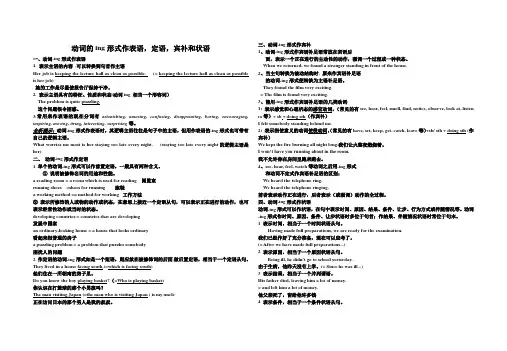
动词的ing形式作表语,定语,宾补和状语一、动词-ing形式作表语1. 表示主语的内容,可以转换到句首作主语Her job is keeping the lecture hall as clean as possible. (= keeping the lecture hall as clean as possible is her job)她的工作是尽量使报告厅保持干净。
2. 表示主语具有的特征、性质和状态(动词ing 相当一个形容词)The problem is quite puzzling.这个问题很令困惑。
3.常用来作表语的现在分词有astonishing, amusing, confusing, disappointing, boring, encouraging, inspiring, moving, tiring, interesting, surprising等。
全析提示:动词-ing形式作表语时,其逻辑主语往往是句子中的主语,但用作表语的-ing形式也可带有自己的逻辑主语。
What worries me most is her staying too late every night. (staying too late every night的逻辑主语是her)二、动词-ing形式作定语1 单个的动词-ing形式可以作前置定语,一般具有两种含义。
①说明被修饰名词的用途和性能。
a reading room = a room which is used for reading 阅览室running shoes =shoes for running 跑鞋a working method =a method for working 工作方法②表示所修饰的人或物的动作或状态,在意思上接近一个定语从句,可以表示正在进行的动作,也可表示经常性动作或当时的状态。
developing countries = countries that are developing发展中国家an ordinary-looking house = a house that looks ordinary看起来很普通的房子a puzzling problem = a problem that puzzles somebody困扰人的问题2 作定语的动词-ing形式如是一个短语,则应放在被修饰词的后面,做后置定语,相当于一个定语从句。
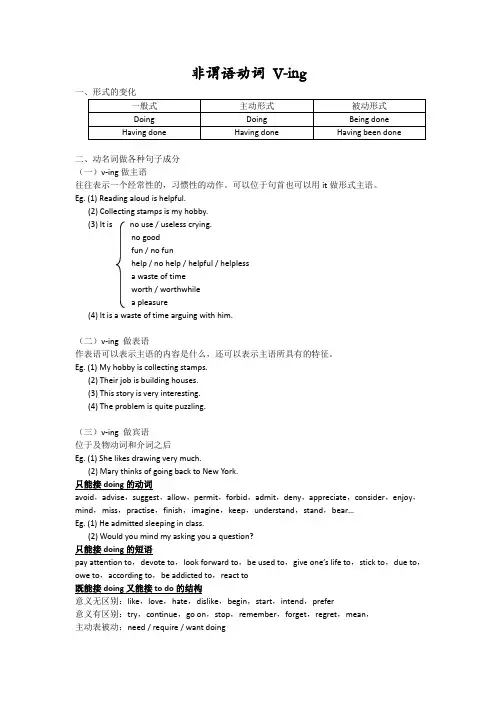
非谓语动词V-ing二、动名词做各种句子成分(一)v-ing做主语往往表示一个经常性的,习惯性的动作。
可以位于句首也可以用it做形式主语。
Eg. (1) Reading aloud is helpful.(2) Collecting stamps is my hobby.(3) It is no use / useless crying.no goodfun / no funhelp / no help / helpful / helplessa waste of timeworth / worthwhilea pleasure(4) It is a waste of time arguing with him.(二)v-ing 做表语作表语可以表示主语的内容是什么,还可以表示主语所具有的特征。
Eg. (1) My hobby is collecting stamps.(2) Their job is building houses.(3) This story is very interesting.(4) The problem is quite puzzling.(三)v-ing 做宾语位于及物动词和介词之后Eg. (1) She likes drawing very much.(2) Mary thinks of going back to New York.只能接doing的动词avoid,advise,suggest,allow,permit,forbid,admit,deny,appreciate,consider,enjoy,mind,miss,practise,finish,imagine,keep,understand,stand,bear…Eg. (1) He admitted sleeping in class.(2) Would you mind my asking you a question?只能接doing的短语pay attention to,devote to,look forward to,be used to,give one’s life to,stick to,due to,owe to,according to,be addicted to,react to既能接doing又能接to do的结构意义无区别:like,love,hate,dislike,begin,start,intend,prefer意义有区别:try,continue,go on,stop,remember,forget,regret,mean,主动表被动:need / require / want doing(四)v-ing 做宾补一般用来补充说明宾语的性质、状态、动作等感官动词包含“致使”含义的句型感官动词:see sb. doinghear sb. doinglisten to sb. doingfeel sb. doingwatch sb. doingobserve sb. doingnotice sb. doing包含“致使”含义的句型:keep sb. doinghave sb. doingget sb. doingleave sb. doing(五)V-ing 做定语:与逻辑主语是主动关系1、形容词化了的非谓语a _______________ (frighten) teacher2、v-ing:动名词和现在分词a waiting rooma waiting boya walking sticka walking man3、做定语时,与v-ed的比较I have a friend _____________(produce) clothes.I wear a dress ______________(produce) in Japan.He met a man _____________ (come) from America.He brought some food _____________(come) from America.Eg. (1) The boy ____________(call) me last night is my brother.I know a girl ___________(call) Lily.(3) There is a girl ___________(wear) a beautiful dress.___________(dress) a beautiful dress.三、其他特殊用法。
非谓语动词二.v-ing1.作主语:Smoking is forbidden here.这里禁止抽烟。
Seeing is believing.Talking is easier than doing.___________________(爬山) is interesting.爬山很有趣。
Driving a car during the rush hour is tiring.在高峰时刻开车令人厌烦。
____________ (散步)is a good form of exercise for both young and old.散步是一种老幼皆宜的锻炼形式。
Once your business becomes international,________________(经常飞) will be part of your life. 一旦你的生意走向国际市场,经常飞就成了你生活的一部分。
__________________________(用英语写文章) is not an easy job. (文章essay)用英语写文章不是一件容易的工作。
注意:–ing作主语时,如果其结构较长,可用it作形式主语,而将作主语的-ing后置It is nice seeing you again.真高兴又遇到了你。
It is good playing chess after supper.晚饭后弈棋挺好。
It is expensive running this car.开这种小车是浪费。
如:It isn’t much good writing to them again.It’s no use waiting here.固定句型:It is + no use/no good +doing sth.It is useless doing…..It is no use crying.哭没有用It is no good writing to them again.It is useless speaking.光说没用。
非谓语动词--V-ing练习非谓语动词—Ving练习:判断下列句子正误1. 从窗户看出去,我们看见一个漂亮的花园。
a. Looking out through the window, the garden was beautiful.b. Looking out through the window, we saw a beautiful garden.2. 我看着晚报的时候,一只狗开始叫起来。
a. Reading the evening newspaper, a dog started barking.b. I was reading the evening newspaper when a dog started barking.3. 听到这个消息,我的眼泪忍不住流下来。
a. Hearing the news, tears ran down her face.b. Hearing the news, she cried out sadly.4.等公汽的时候,一块砖头砸在我的头上。
a. waiting for the bus , a brick fell on my head.b.waiting for the bus ,I was hit by a brick on the head.5.打开窗户,一只蝴蝶飞进来了。
a. Opening the window, a butterfly flew into my room.b. Opening the window, I saw a butterfly flying into my room.6.如果你努力学习,你的梦想一定会实现。
a.Working hard with a strong will, your dream will certainly come trueb.Working hard with a strong will, you'll certainly make your dream come true把下面句子改成独立主格形式1.If the weather permits, we’ll go out on an outing.2.Because it is Sunday, we needn't go to school.3.Since there was no buses, we had to walk home . .4.As the boy led the way, we had no trouble finding the village.1. _________,I will go over all these lessons before the exam.A. If time will permitB. Time permitsC. Time permittedD. Time permitting2. I carefully poured the liquid into the water , my classmates _______anxiously beside me to see what would happen.A. stoodB. standingC. to stoodD. were standing辨别正误1.尽管被告知了很多次,但是他仍然不能理解。
非谓语动词—V-ing形式Exercise (一):1. Alien said that his trip was _______.A. interestedB. interestC. interestingD. of interest2. We can't understand ______ a decision until it is too late.A. him to postpone to makeB. his postponing to makeC. him to postpone makingD. his postponing making3. I couldn't understand ______ at the poor child.A. you to laughB. you laughC. why laughD. you laughing4. It's no use______ with him. You might as well ______ with a stone wall.A. arguing, argueB. to argue, arguingC. arguing, arguingD. to argue, argue5. It is no good ______ today's work for tomorrow.A. to leaveB. leavingC. that you leaveD. leave6. The old man's ______ pity on the snake led to his own death.A. takeB. takingC. being takenD. have7. It's very kind ______ you ______ say so.A. of, toB. for, toC. to, toD. of, /8. Some people's greatest pleasure is ______ .A. fishingB. to fishC. to be fishD. being fishing9. Remember ______ the book, when you have finished it.A. putting backB. having put backC. to put backD. will put back10. You didn't hear us come back last night. That's good. We tried ______ noisy.A. to not beB. not to beC. being notD. not being11. Though he failed, he tried _______ it again and again.A. to doB. doingC. doD. done.12. You'll regret ______ those words. You may hurt her feelings.A. sayB. to sayC. having saidD. to have said13. You can keep the book until you ______ .A. have finished readingB. finish to readC. will finish readingD. have finished to read14. We are looking forward to ______ another chance ______ it again.A. be given, to tryB. give, to try .C. giving, tryingD. having, to try15. Most of the students enjoy_____ stamps.A. collecB. to collectC. collectingD. collected16. Excuse me for _____ in without ______.A. coming, askingB. coming, being askedC. to come, askingD. to come, being asked17. People couldn't help ______ the foolish girl.A. laugh atB. to laugh atC. laughing atD. laughing :18. "What do you think of the book?" "Oh. excellent, it's worth _______ a second time."A. to readB. to be readC. readingD. being read19. "I usually go there by train." "Why not ______ by boat for a change?"A. to try goingB. trying to goC. to try and goD. try going20. I was too excited ______ .A. speakB. to speakC. not to speakD. speaking21. Charles Babbage is generally considered ______ the first computer.A. to inventB. inventingC. to have inventedD. having invented22. It is no use _____to come now. He is busy.A. ask himB. to ask himC. that you ask himD. asking him24. Mrs Smith warned her daughter ____ after drinking.A. never to driveB. to never driveC. never drivingD. never drive.26. Do you know the boy _______ under the big tree?A. layB. lainC. layingD. lying29. "Can you read?" Mary said to the notice.A. angrily, pointingB. and point angrilyC. angrily, pointedD. and angrily pointing30. There was a terrible noise _______ the sudden burst of Tight.A. followedB. followingC. to be followedD. being followed33. Your flat needs _____ . Would you like me it for you?A. to clean, to doB. cleaning, doingC. cleaning, to doD. to be cleaned, doing34. Does your new secretary ____ short hand?A. know to takeB. know how to takeC. know how takeD. know how taking35. Tommy had his big brother _____ his shoes for him.A. to tieB. tieC. tiedD. tying36. Would you please ______ write on the textbooks?A. don'tB. not toC. notD. to not37. I'd ______ the operation unless it is absolutely necessary.A. rather not haveB. rather not to haveC. not rather hadD. rather not having38. Your mother and I are looking forward________ you.A. of seeingB. for seeingC. to seeD. to seeing39. The girl couldn't_____ how red his face was.A. help to noticeB. be helping to noticeC. be helping noticingD. help noticingExercise(二)1. The old farmer,________ the badly-injured and wounded soldier, came out of the burning house, ________for help.A. supporting; callingB. supported by; calledC. being supportedD. being supporting; called2. -Oh, it’s already a quarter past six. What shall we do at the meeting this evening?-We’ll go on with the matter________ this afternoon.A. be discussedB. being discussingC. discussedD. which discussed3. The brave man died,________ his young wife nothing but a________ cottage.A. left; breakingB. leaving; brokenC. left; brokenD. to leave; breaking7.________, the boy couldn’t enter his house.A. Since the key has lostB. The key been lostC. Lost the keyD. Having lost the key10. ________from heart trouble for years, Professor White has to take some medicine with him wherever he goes.A. SufferedB. To sufferC. Having sufferedD. Being suffered11. ________from what he said, he must be the thief who has stolen the car.A. JudgingB. JudgedC. To judgeD. Judge12. ________with fright, a hungry fox hid himself in a small cave, ________his tail to the rain.A. Trembling; exposingB. Trembled; exposedC. Trembled; exposingD. Trembling; exposed14. -Who were those people with the flags?-A group________ itself the League of Peace.A. callsB. callingC. calledD. being called15. ________you the truth, she knows nothing about it.A. TellB. TellingC. To tellD. Told16. We slept with the light________ all night long last night.A. burntB. to burnC. being burntD. burning17. Linda can’t attend the party________ at Tom’s house at present because she is preparing a speech for the party ________ at Marie’s house tomorrow.A. being held; to be heldB. to be held; heldC. held; being heldD. to be held; to be held18. The situation is more ________than ever. I’m ________about what to do next.A. puzzled; puzzledB. puzzling; puzzlingC. puzzling; puzzledD. puzzled; puzzling19. When________ that it was getting late, I put off the light and went to bed.A. findB. findingC. foundD. to find21. Daddy didn’t mind what we were doing, as long as we were together, _______fun.A. hadB. haveC. to haveD. having22. Don't leave the water _____ while you brush your teethA. runB. runningC. being runD. to run26.A cook will be immediately fired if he is found ___ in the kitchen.A. smokeB. smokingC. to smokeD. smoked27. He sent me an E-mail, _______ to get further information.A. hopedB. hopingC. to hopeD. hope。
非谓语动词V-ing专题及练习一.划分句子结构1. Finding ways to grow more rice has been his life goal.2. His performance is disappointing.3. He tries cutting and chewing the bottom of the shoe.4. They did everything they could to prevent the river from being polluted.5. There is a swimming pool in our school.6. I heard someone playing the piano in the next room.7. They went out of the classroom, talking and laughing.动词的-ing形式是一种非谓语动词。
-ing形式仍保留有动词的特征,可以带1)一般式:________Seeing is believing.2)被动式:________The truck being repaired there is ours.Being repaired, the computer can’t be used now.He came to the party without being invited.(v-ing被动式一般式所表示的动作是一个被动动作,这个被动动作也是和句中谓语所表示的动作_______发生的。
它一般在句中作定语或状语用。
)3)完成式:________We remembered having seen the film.Having answered the letter, she went on to read an English novel.(v-ing完成式所表示的动作发生在句中谓语动词所表示的动作之______,一般在句中作宾语,时间或原因状语用。
句中的_______是它的逻辑主语,并且是它所表示的动作的执行者.)4)完成被动式:________Having been shown the lab, we were taken to see the library.(v-ing完成被动式所表示的动作发生在谓语动词所表示的动作之前,在句中一般作状语或宾语用。
)5)否定式:not + doingI regret not following his advice.三.V-ing 的基本用法Ⅰ. V-ing作主语1. ________(say)is easier than doing.2. ________(eat)junk food is one of my hobbies.3. It is no use ________(cry)crying over spilt milk.4. It’s no good ________(read)in dim light.5.There is no use/point in ________(wait)here.6.There is no need ________(do)it again.归纳:1. V-ing 一方面具有动词的性质,另一方面也相当于一个________,在句中可以作________。
2. –ing作主语时,如果其结构较长,可用it作形式主语,而将作主语的-ing后置。
做什么是没有用/没有好处/是浪费时间的__________________________3. 做什么是没有意义的__________________________(但,做什么是没有必要/可能的__________________________ )Ⅱ. V-ing作宾语1. 作及物动词的宾语I suggest ________(do)it in a different way.能接-ing分词作宾语的动词:避免错过少延期(________, ________,________/________/________)建议完成多练习(________, ________, ________)喜欢想象禁不住(________,________, ________)承认否定和嫉妒(________, ________, ________)逃脱冒险莫原谅(________, ________,_______)忍受欣赏别介意(________, ________, ________)注:v-ing作宾语也可用在复合宾语中作真正的宾语,而用it作形式宾语。
如:We found it no good talking like that.Do you think it necessary trying again?2.作介词的宾语:(1)Her sister is good at ________(learn)physics.(2)I have no difficulty (in) ________(communicate)with foreigners. (3)He used to spend a lot of time (in) ________(play)games.归纳:-ing前省略介词in 的常用结构:3. 作形容词worth等的宾语:This book is well worth reading.V-ing作need, want, require, deserve的宾语时,主动形式表达被动意义。
The blackboard need cleaning/to be cleaned.Ⅲ. V-ing作表语1. His hobby is ________(collect)stamps.2.The problem is quite ________(puzzle).3.My job is ________(look)after the children.归纳:V-ing作表语可以表示主语的__________或__________Ⅳ. V-ing作定语:a_________ stick (拐杖) a _________boy (一个酣睡的孩子)the ____________ news (令人振奋的消息)Do you love the girl __________________________? (你喜欢坐在角落里的那个女孩吗?)The building ____________(build) now is going to be finished next month. (正被建造这的那座教学楼将于下个月完工。
)归纳:①单个的V-ing作定语一般放在被修饰词的前面, 一般表性质,用途或正在进行的动作②V-ing短语作定语应放在被修饰词的后面,也相当于一个_________从句。
练习1.Do you know the man________(stand)at the gate?2. The meeting ________(hold)now is very important.3. The president________(hold)the meeting is my neighbor.4. Two days later, I received a letter ________(offer)me the job.Ⅴ. V-ing作宾补:1. I heard someone_______ (knock) at the door at that time2. I noticed a man _______ (run) out of the bank when I got off the car.3. Last night the shopkeeper caught a child _______ (steal) some food in the shop. 归纳:动词see, watch, notice,observe, hear, feel, find, have, keep, catch等后常带-ing作宾补。
Ⅵ. V-ing作状语【例句呈现】观察下列句子中动词–ing 形式作状语的用法,然后加以总结。
1. Seeing (= When he saw ) a note on the ground, the stranger picked it up.2. Being late (= As he was late ) , he could not be allowed to join in the activity.3. Mr. Brown was killed in an accident, leaving (=and left) behind a wife and child.4. The stranger was walking through the village, looking (= and looked) this way and that.5. She came in, smiling (=and smiled)归纳:1. V-ing作状语,表时间、原因、结果、条件、让步、方式、伴随等2. v-ing作状语时,它的逻辑主语就是整个句子的______。
练习1. The students ran out of the room, _______ (laugh) merrily.2. _______ (follow) the guide, they started to climb.3. _______ (see) nobody at home, she decided to leave them a note.4. His parents were killed in the accident, _______ (leave) leaving him an orphan.5. When _______ (cross) the road, please be careful.6. On _______ (arrive) in London, he managed to get in touch with her.7._______ (eat)too much, he couldn’t go to sleep.8._______ (show)around the school, we were then taken to see the library.四.V-ing的复合结构:V-ing的复合结构通常由形容词性物主代词、人称代词宾格、名词所有格或者名词的普通格+-ing分词构成,通常在句中作主语、表语、宾语。